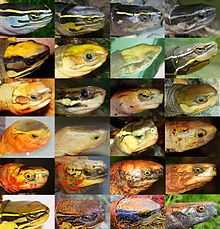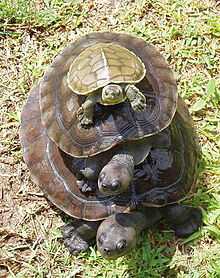Asian box turtle
| Asian box turtle | |
|---|---|
 | |
| Amboina box turtle, Cuora amboinensis | |
| Scientific classification | |
| Kingdom: | Animalia |
| Phylum: | Chordata |
| Class: | Reptilia |
| Order: | Testudines |
| Family: | Geoemydidae |
| Subfamily: | Geoemydinae |
| Genus: | Cuora Gray, 1856 |
| Species | |
|
about 12 | |
| Synonyms | |
| |
Asian box turtles are turtles of the genus Cuora in the family Geoemydidae. There are about 12 species.[1] The keeled box turtle (Pyxidea mouhotii syn. Cuora mouhotii) is often included in this genus, or separated in the monotypic genus Pyxidea. Genus Cuora is distributed from China to Indonesia and the Philippines.[1]
Description
Cuora species are characterized by a low (e.g. Cuora pani) to high (e.g. Cuora picturata) domed shell, which usually has three keels on the carapace. They are reddish, yellowish, brown, grey, and/or black in color. Some species have bright yellow, black, orange, or white stripes down the length of their keels. Their body color is highly variable, but usually very intense. Most species show stripes of variable color down either side of their heads, which usually meet at the nose.
Behavior
Asian box turtles are terrestrial, semiaquatic or mainly aquatic, most spending much of their time on the edge of shallow swamps, streams or pond that are dense with vegetation. Most are omnivorous, but carnivores do occur.

Cuora amboinensis amboinensis (Sulawesi), Cuora amboinensis kamaroma (Thailand), Cuora amboinensis ssp. (unknown), Cuora amboinensis ssp. (Philippines); Cuora trifasciata (Guangdong, China), Cuora aurocapitata (Anhui, China), Cuora pani pani (Shaanxi, China), Cuora yunnanensis (Yunnan, China); Cuora cyclornata cyclornata (Annam, central Vietnam), Cuora cyclornata meieri (north Vietnam), Cuora mccordi (Guangxi, China), Cuora zhoui (unknown); Cuora flavomarginata sinensis (Sichuan, China), Cuora flavomarginata evelynae (Ryukyu Islands, Japan), Cuora flavomarginata flavomarginata (Taiwan), Cuora picturata (southern Annam, south Vietnam); Cuora galbinifrons galbinifrons (north Vietnam), Cuora galbinifrons galbinifrons (Hainan, China); Cuora bourreti (Annam, central Vietnam), Cuora bourreti (Laos); Cuora cyclornata cyclornata × Cuora amboinensis kamaroma hybrid, Cuora cyclornata × Pyxidea mouhotii, Cuora trifasciata × Pyxidea mouhotii, Cuora galbinifrons × Pyxidea mouhotii = "Cuora serrata"
Taxonomy and systematics
Listed alphabetically by binomial name.[2] Cuora]. The Reptile Database
- Amboina box turtle, C. amboinensis (four subspecies)
- Amboina box turtle, C. a. amboinensis
- Javanese box turtle, C. a. couro
- Malayan box turtle, C. a. kamaroma
- Lineated amboina box turtle, C. a. lineata
- Yellow-headed or golden-headed box turtle, Cuora aurocapitata or C. (pani) aurocapitata[Note 1]
- Bourret's box turtle, C. bourreti
- Ryukyu yellow-margined box turtle, C. evelynae
- Chinese box turtle, yellow-margined box turtle, or snake-eating turtle, C. flavomarginata (two subspecies)
- Indochinese box turtle or Indochinese flowerback box turtle, C. galbinifrons
- McCord's box turtle, C. mccordi
- Keeled box turtle, C. mouhotii
- Pan's box turtle, C. pani = "C. chriskarannarum"
- Southern Vietnamese box turtle, C. picturata
- Golden coin turtle or Chinese three-striped box turtle, C. trifasciata
- Yunnan box turtle, C. yunnanensis - rediscovered in 2004, verified in 2007.
- Zhou's box turtle, C. zhoui = "C. pallidicephala"
Cuora serrata, originally described as C. galbinifrons serrata by Iverson & Mccord[5] and later considered a distinct species[6] are hybrids of the keeled box turtle and taxa of the Indochinese box turtle complex as shown by the genetic studies of Parham et al.[7] and Stuart & Parham (2004). A single specimen of C. serrata has been found in the wild,[8] lending credence to the possibility that other specimens arose through natural hybridization or even from wild populations. No Chinese turtle farm is known to produce C. serrata-like specimens.[9] The occurrence of wild hybrids is often regarded as "evolution in progress", a terminology and point of view that is not always accepted. It has yet to be confirmed, whether all C. serrata from the wild have originated by direct hybridization of C. mouhotii and C. galbinifrons, or also by "hybridisation" of C. serrata × C. serrata.
Unnamed hybrids of several other Cuora taxa are also known,[Note 2] as are intergeneric hybrids such as Mauremys iversoni,[10] a hybrid between Cuora trifasciata and Mauremys mutica which are intentionally produced in Chinese turtle farms.[7]
In captivity
Wild-caught C. amboinensis specimens were frequently available in the exotic animal trade, but are getting rarer now; other species are rare to commercially extinct.
Notes
| Wikimedia Commons has media related to Cuora. |
References
- ↑ 1.0 1.1 Spinks, P. Q., et al. (2012). Species boundaries and phylogenetic relationships in the critically endangered Asian box turtle genus Cuora. Molecular Phylogenetics and Evolution 63(3), 656-67.
- ↑ [http://reptile-database.reptarium.cz/advanced_search?genus=Cuora&exact%5B0%5D=genus&submit=Search
- ↑ H. Artner (2004). "Haltung und Nachzucht von Pans Scharnierschildkröte Cuora pani pani Song, 1984 und der Goldkopf-Scharnierschildkröte Cuora pani aurocapitata Luo & Zong, 1988". Emys 11 (1): 4–21.
- ↑ T. Blanck & M. Tang (2005). "Ein neuer Fundort von Cuora pani Song, 1984 mit Diskussion über den taxonomischen Status von Cuora pani und Cuora aurocapitata". Sacalia 7 (3): 16–37.
- ↑ J. B. Iverson & W. P. McCord (1992). "A new subspecies of Cuora galbinifrons (Testudines: Batagurinae) from Hainan Island, China". Proceedings of the Biological Society of Washington 105: 433–439.
- ↑ F. J. Obst & U. Fritz (1997). "Zum taxonomischen Status von Cuora galbinifrons serrata Iverson & McCord, 1992 und Pyxidea mouhotii (Gray, 1862)". Zoologische Abhandlungen (Museum für Tierkunde Dresden) 49 (2): 261–279.
- ↑ 7.0 7.1 James Ford Parham, W. Brian Simison, Kenneth H. Kozak, Chris R. Feldman & Haitao Shi (2001). "New Chinese turtles: endangered or invalid? A reassessment of two species using mitochondrial DNA, allozyme electrophoresis and known-locality specimens". Animal Conservation 4 (4): 357–367. doi:10.1017/S1367943001001421. "Erratum". Animal Conservation 5 (1): 86. doi:10.1017/S1367943002001117.
- ↑ H. Shi, J. F. Parham, W. B. Simison, J. Wang, S. Gong & B. Fu (2005). "A report on the hybridization between two species of threatened Asian box turtles (Testudines: Cuora) in the wild on Hainan Island (China) with comments on the origin of C. serrata-like turtles". Amphibia-Reptilia 26 (3): 377–381. doi:10.1163/156853805774408487.
- ↑ Zhou et al. (2008)
- ↑ Peter C. H. Pritchard & William P. McCord (1991). "A new emydid turtle from China". Herpetologica 47 (2): 138–147. JSTOR 3892730.
Further reading
- Buskirk, J. R., et al. (2005). On the hybridisation between two distantly related Asian turtles (Testudines: Sacalia × Mauremys). Salamandra 41, 21-26.
| |||||||||||||||||||||||||||||||||||||||||||||||||||||||||||||||||||||||||||||||||||||||||
| ||||||||||||||||||||||||||||||||||||||||||||||||||||||||||||||||||||||||||||||||||||||||||||||||||||||||||||||||||||||||||||||||||||||||||||||||||||
